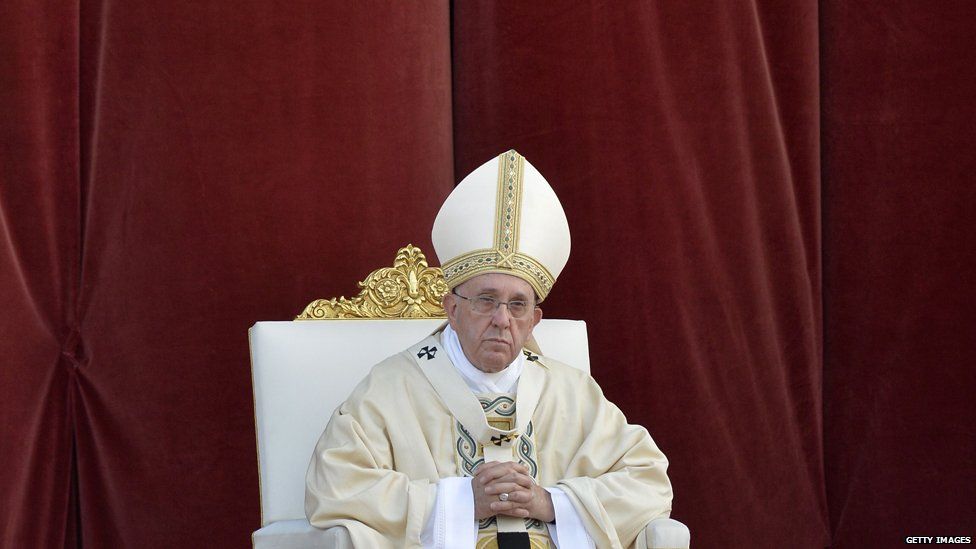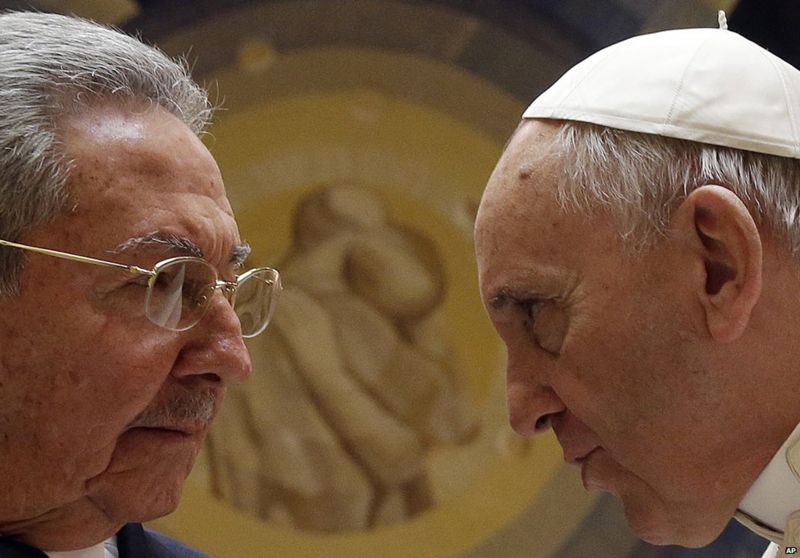Is Pope Francis A Communist? Exploring The Controversy
Is Pope Francis a Communist? The question, frequently posed in recent years, stems from the pontiff's strong criticisms of capitalism and his emphasis on social justice, sparking a debate that reaches the heart of the Catholic Church's role in the modern world.
The debate surrounding Pope Francis's perceived political leanings has intensified in recent years. His words and actions, particularly his critiques of unbridled capitalism and his focus on the plight of the poor, have led some to question whether he aligns with communist ideologies. The complexity of the issue is further compounded by the fact that Pope Francis himself vehemently denies being a communist, asserting that his concerns are rooted in the Gospel of Christ rather than the doctrines of Marx or Engels.
Pope Francis, whose criticisms of unbridled capitalism have prompted some to label him a Marxist, said in an interview published on Sunday that communists had stolen the flag of Christianity. This statement captures the tension at the core of the discussion: the apparent overlap between the ideals of social justice espoused by both communism and Christianity. While both systems, in theory, strive for a society where the needs of the many are prioritized, the fundamental differences in their philosophical underpinnings and the implementation of their principles often lead to stark contrasts.
In Brussels, on September 27, 2024, Pope Francis delivered a speech at the palace of Laeken, which further fueled the debate. His frequent meetings with representatives of various groups, including those advocating for dialogue between socialists and Christians, have also drawn scrutiny. These encounters, such as his meeting with the Dialop transversal dialogue project, an initiative that seeks to build a better future, are seen by some as evidence of a leaning towards leftist ideologies.
The Argentine pope's perspective, shaped by his South American background and his embrace of liberation theology, a theological movement deeply influenced by Marxism, has further complicated the issue. His responses to accusations of communism are often nuanced, drawing on the teachings of the Gospels, particularly Matthew 25, which emphasizes the importance of caring for the poor and marginalized. "If I see the gospel in a sociological way only, yes, I am a communist, and so too is Jesus," he stated in an interview with America magazine. This statement underlines the apparent congruence between the Gospel's teachings and the communist ideals of social equality and economic justice.
His concern for the "poor" is indeed grounded in the Gospel, not the ideology of Marx, Engels, or any other. Furthermore, Pope Francis has also spoken more negatively of communism, calling it "a 'freedom' forced, limited from outside, decided by someone else." However, his critics often point to his actions and statements as evidence of an affinity for socialist thought. His meetings, his choice of words when speaking about capitalism, and his emphasis on social justice all seem to point to the opposite.
The history of the Catholic Church's relationship with communism is complex and often fraught with tension. As Jesus Christ reveals no one can serve two masters; under communism, however, that master is the state. There is no room for God. John Paul II, who personally withstood communist persecution as Archbishop of Krakow, visited communist Nicaragua in 1983. The Church, particularly under the leadership of Pope John Paul II, was often in direct opposition to communist regimes, viewing them as a threat to religious freedom and human dignity. Pope Francis's willingness to engage in dialogue with those on the left, despite these historical tensions, demonstrates a shift in approach. The call for cooperation between Christians and Marxists, as he did this week, underscores his belief in finding common ground for the betterment of society. The "new path," to use Franciss phrase, that the Spanish Marxists wanted to open for humanity would be blazed by the flames of burning convents.
Pope Francis's criticism of the free market economy has turned him into an icon of the left, and fueled claims that he is a communist. The leader of the world's 1.2 billion Catholics has called capitalism a source of inequality at best and a killer at worst. This stance, coupled with his emphasis on the churchs social teachings, has further propelled the perception of the pontiff as a progressive leader.
The debate is not just theoretical. For starters, those probing whether or not Pope Francis is himself a communist, socialist, or Marxist (these terms are interchangeable on the right) are not really interested in discovering what his true political beliefs are; rather, they are looking for evidence of the ideological rot that, in their view, has infected the church.
The key questions revolve around three core relationships: our relationship to God, our relationship to our neighbor, and our relationship to the earth. Pope Francis has shown that the Christian tradition has never recognized the right to private property as absolute or inviolable. Rome Newsroom, January 12, 2024, reported on Pope Francis's call for dialogue. Although details of the pact remain undisclosed, the implications are significant.
The reality is that Pope Francis is a complex figure, defying simple categorization. As a leader of a global religion with a rich history and a commitment to social justice, he is bound to be seen through different lenses. His vision, rooted in his faith, compels him to address complex issues. The world is grappling with, and his commitment to his faith, his concern for the marginalized, and his willingness to engage in dialogues will continue to spark debate and provoke reflection.
In response, Israeli Minister of Diaspora Affairs Amichai Chikli penned a response. Pope Francis recent trip to Latin America has rekindled questions about whether he endorses socialism, or even communism. The Pope's communitarian, populist message shows just how far the Church has shifted in five decades and how thoroughly capitalism has displaced communism as a monolithic political force.
The Popes words continue to echo through the world. Some people say Pope Francis is a communist, to which the Argentine Jesuit replies: "Look, I am defined by Matthew 25. Read chapter 25 of the Gospel of Matthew, and then tell me if the person who spoke those words is a communist."
| Attribute | Details |
|---|---|
| Name | Jorge Mario Bergoglio (Pope Francis) |
| Born | December 17, 1936 |
| Birthplace | Buenos Aires, Argentina |
| Education | Master's Degree in Philosophy (Argentina), Studies in Chemistry |
| Religious Order | Society of Jesus (Jesuits) |
| Ordained | December 13, 1969 (as a priest) |
| Episcopal Ordination | June 27, 1992 (as Titular Bishop of Auca) |
| Former Archbishop | Buenos Aires, Argentina (1998-2013) |
| Elected Pope | March 13, 2013 |
| Papal Motto | Miserando atque eligendo (Having mercy, he called him) |
| Key Themes | Social Justice, Care for the Poor and Marginalized, Environmental Stewardship |
| Significant Encyclicals | Evangelii Gaudium (The Joy of the Gospel), Laudato si' (On Care for Our Common Home), Fratelli Tutti (On Fraternity and Social Friendship) |
| Controversial Statements | Criticisms of Capitalism, Comments on LGBTQ+ Issues, Dialogue with other religions |
| Notable Actions | Emphasis on mercy and forgiveness, Financial reforms in the Vatican, Outreach to the poor and marginalized |
| Website | Vatican Website |



